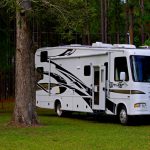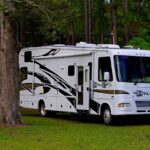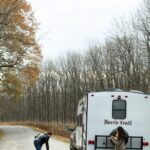Have you ever dreamt of hitting the open road, waking up to a new view every morning, and living life on your own terms? The allure of RV living is undeniable, but is it truly a good investment? In this comprehensive guide, we’ll explore the ins and outs of RV ownership, diving deep into the financial aspects, lifestyle benefits, and challenges that come with living in an RV.
Imagine this: a couple, tired of the daily grind and mortgage payments, decides to trade their traditional home for a cozy RV. They hit the road, visiting national parks and coastal towns, but soon realize that RV ownership is not just about freedom and adventure—it’s also about navigating costs, maintenance, and the occasional breakdown. So, what does it really mean to invest in an RV for full-time living? Let’s unravel the mystery together and discover whether this lifestyle is the right fit for you!
Key Takeaways
- RV ownership is generally not a good financial investment due to rapid depreciation and ongoing costs.
- Lifestyle benefits include the freedom to travel, a sense of community, and the potential for rental income.
- Maintenance and repair costs can add up quickly, requiring careful budgeting.
- Consider your travel habits and personal preferences before deciding if RV living is right for you.
- Explore rental options before making a purchase to ensure the RV lifestyle suits your needs.
Ready to dive deeper into the world of RV living? Shop RVs on RVShare | Explore RV accessories on Camping World!
Table of Contents
- Quick Tips and Facts: Is an RV a Good Investment?
- The Evolution of RV Living: A Modern Perspective
- Understanding What an RV Investment Looks Like
- The Pros of Investing in an RV for Full-Time Living
- The Cons of RV Living: What You Need to Know
- Is RV Ownership a Smart Financial Move?
- Comparing RV Living to Traditional Housing: A Financial Breakdown
- Lifestyle Considerations: Is RV Living Right for You?
- Maintenance Costs: What to Expect When Living in an RV
- Financing Your RV: Tips for a Smart Purchase
- The RV Community: Building Connections on the Road
- FAQs: Your Burning Questions About RV Living Answered
- Related Topics: Exploring the RV Lifestyle Further
- Need a Change of Scenery? The Freedom of RV Living
- Conclusion: Is an RV a Good Investment for You?
- Recommended Links: Further Reading on RV Living
- FAQs: More Questions About RV Living
- Reference Links: Sources for Your RV Journey
Quick Tips and Facts: Is an RV a Good Investment? 🤔
- RV ownership is generally not a good financial investment, as RVs depreciate quickly. 📉
- Exceptions: Rare vintage RVs that gain value, and RVs used as rentals that bring in more than they cost. 📈
- Costs of RV ownership: RV loan payments, RV insurance, RV storage, replacement parts, and regular maintenance. 💸
- Benefits of RV ownership: Freedom of RV travel, low-cost travel, RV lifestyle community, and potential for rental income. 🚐
- Challenges of RV living: RV breakdowns, need for maintenance and repairs, and logistical challenges of full-time RV living. 🚨
The Evolution of RV Living: A Modern Perspective 🚐
RV living has come a long way since its humble beginnings. With advancements in technology and design, modern RVs offer a comfortable and convenient way to travel and live on the road. However, it’s essential to consider the pros and cons of RV ownership before making a decision.
History of RV Living
- The first RVs were built in the early 20th century, with the first motorhome being constructed in 1910. 🚗
- RVs gained popularity in the 1950s and 1960s, with the introduction of more affordable and accessible models. 🌟
- Today, there are over 11 million RVs on the road in the United States alone, with more people turning to RV living as a lifestyle choice. 🚐
Understanding What an RV Investment Looks Like 📊
When considering an RV investment, it’s essential to understand the costs involved. Here’s a breakdown of the typical costs associated with RV ownership:
| Cost Category | Description |
|---|---|
| Purchase Price | The initial cost of buying an RV, which can range from $10,000 to over $100,000. 💸 |
| Financing Costs | Interest rates on RV loans can range from 5.24% to 19.95% or more, with most falling towards the higher end. 📈 |
| Insurance | RV insurance premiums can vary depending on the type of RV, usage, and location. 🚨 |
| Maintenance and Repairs | Regular maintenance and repairs can cost upwards of $1,000 per year. 💪 |
| Storage | If you don’t plan to use your RV full-time, you’ll need to consider storage costs, which can range from $50 to $200 per month. 📦 |
The Pros of Investing in an RV for Full-Time Living 🌟
While RV ownership may not be a good financial investment, it can be a great lifestyle investment. Here are some pros to consider:
- Freedom of Travel: With an RV, you can travel wherever you want, whenever you want. 🚐
- Low-Cost Travel: RVing can be a cost-effective way to travel, especially if you boondock or use campground memberships. 📊
- RV Lifestyle Community: Join a welcoming and supportive community of RV enthusiasts who share tips, offer help, and create friendships. 👫
- Potential for Rental Income: Earn money by renting out your RV when you’re not using it through platforms like RVshare or rental management companies. 📈
The Cons of RV Living: What You Need to Know 🚨
While RV living can be a great lifestyle choice, there are some cons to consider:
- RV Breakdowns: RVs can break down frequently, and repairs can be costly. 🚨
- Need for Maintenance and Repairs: Regular maintenance and repairs can be time-consuming and expensive. 💪
- Logistical Challenges: Full-time RV living can be challenging, especially when it comes to receiving mail, maintaining relationships, and managing finances. 📊
Is RV Ownership a Smart Financial Move? 🤔
While RV ownership may not be a good financial investment, it can be a smart financial move if you use it regularly for travel and camping. Here are some tips to consider:
- 👉 Shop within your budget: Don’t overspend on an RV that you can’t afford. 💸
- Consider rental income: Renting out your RV can help offset the costs of ownership. 📈
- Rent an RV before purchasing: Try before you buy to see if RV living is right for you. 🚐
Comparing RV Living to Traditional Housing: A Financial Breakdown 📊
When considering RV living, it’s essential to compare it to traditional housing. Here’s a breakdown of the costs:
| Cost Category | Description |
|---|---|
| Mortgage or Rent | The cost of owning or renting a traditional home. 🏠 |
| Utilities | The cost of utilities such as electricity, water, and gas. 💡 |
| Maintenance and Repairs | The cost of maintaining and repairing a traditional home. 💪 |
| Property Taxes | The cost of property taxes on a traditional home. 📊 |
| Insurance | The cost of insurance on a traditional home. 🚨 |
Lifestyle Considerations: Is RV Living Right for You? 🤔
RV living is not for everyone. Here are some lifestyle considerations to think about:
- Travel: Do you enjoy traveling and exploring new places? 🚐
- Freedom: Do you value the freedom to travel wherever you want, whenever you want? 🌟
- Community: Do you enjoy meeting new people and being part of a community? 👫
- Maintenance: Are you comfortable with regular maintenance and repairs? 💪
Maintenance Costs: What to Expect When Living in an RV 🚨
Regular maintenance and repairs are essential to extending the life of your RV. Here are some costs to expect:
| Maintenance Type | Estimated Cost Range |
|---|---|
| Oil Changes | $50 to $100 |
| Tire Replacement | $100 to $500 |
| Battery Replacement | $50 to $200 |
| Appliance Replacement | $100 to $1,000 |
Financing Your RV: Tips for a Smart Purchase 📊
When financing your RV, it’s essential to consider the following tips:
- 👉 Shop around: Compare rates and terms from different lenders. 📊
- Consider a shorter loan term: A shorter loan term can save you money in interest. 📈
- Make a down payment: A larger down payment can lower your monthly payments. 💸
- Check your credit score: A good credit score can qualify you for better rates. 📊
The RV Community: Building Connections on the Road 👫
The RV community is a welcoming and supportive group of people who share tips, offer help, and create friendships. Here are some ways to get involved:
- Join online forums: Websites like RV Forum and RV Life offer a wealth of information and connections. 📊
- Attend RV events: Events like RV shows and rallies offer a great way to meet other RVers. 🎉
- Volunteer: Volunteering at RV parks and campgrounds can be a great way to meet new people. 🌟
FAQs: Your Burning Questions About RV Living Answered 🤔

- Is RV ownership a good investment? Generally, no, but it can be a good lifestyle investment. 📊
- How much does it cost to maintain an RV? Regular maintenance and repairs can cost upwards of $1,000 per year. 💪
- Can I rent out my RV? Yes, platforms like RVshare and rental management companies can help you rent out your RV. 📈
- How do I find RV parks and campgrounds? Websites like RV Parks and Campendium offer a wealth of information. 📊
Related Topics: Exploring the RV Lifestyle Further 🚐
- Full-Time RVing: Is it right for you? 🤔
- RV Maintenance: Tips and tricks for extending the life of your RV. 💪
- RV Insurance: What you need to know. 🚨
- RV Financing: Tips for a smart purchase. 📊
Need a Change of Scenery? The Freedom of RV Living 🌟
RV living offers a unique freedom to travel and explore new places. Here are some reasons to consider RV living:
- Travel: Explore new places and experience new things. 🚐
- Freedom: Travel wherever you want, whenever you want. 🌟
- Community: Join a welcoming and supportive community of RV enthusiasts. 👫
- Adventure: Experience the thrill of adventure and try new things. 🎉
Conclusion: Is an RV a Good Investment for You? 🚐

In summary, RV ownership is not typically a sound financial investment due to rapid depreciation and ongoing costs. However, it can be a fantastic lifestyle investment if you are passionate about travel and adventure. The freedom to explore new places, the sense of community among fellow RVers, and the potential for low-cost travel are compelling reasons to consider RV living.
Positives:
- Flexibility and Freedom: Travel at your own pace and explore off-the-beaten-path destinations.
- Community: Join a vibrant community of like-minded individuals who share tips and experiences.
- Potential for Rental Income: Offset costs by renting your RV when not in use.
Negatives:
- Depreciation: RVs lose value quickly, making them a poor financial investment.
- Maintenance Costs: Regular repairs and upkeep can add up over time.
- Logistical Challenges: Managing mail, relationships, and finances can be tricky.
Ultimately, if you find yourself yearning for adventure and the open road, an RV could be the perfect fit for your lifestyle! However, if you’re primarily looking for a financial investment, you might want to think twice or consider renting an RV first.
Recommended Links 🛒
- 👉 Shop RVs on: RVShare | Outdoorsy | Camping World
- Books on RV Living:
FAQs: More Questions About RV Living 🤔

Is it financially smart to live in an RV? 🤔
The short answer is: it depends!
If you plan to use your RV frequently for travel, it can be a cost-effective alternative to traditional housing, especially if you avoid high campground fees by boondocking or using memberships. However, if you’re considering an RV primarily as an investment, be aware that depreciation can offset any potential savings.
What is the downside of owning an RV? ❌
Owning an RV comes with several downsides:
- High Maintenance Costs: Regular upkeep can be expensive and time-consuming.
- Depreciation: RVs can lose significant value quickly, making resale difficult.
- Logistical Challenges: Managing mail, finances, and relationships can be more complex compared to traditional living arrangements.
Is it worth buying an RV to live in? 🤷♂️
If you love travel and adventure, yes!
An RV can offer a unique lifestyle that allows you to explore new destinations and live more freely. However, it’s essential to weigh the costs and challenges against your lifestyle goals. For many, the experience of travel and community can outweigh the financial drawbacks.
What is the downside of living in an RV full time? 🚨
Living in an RV full-time can present challenges:
- Limited Space: Downsizing can be difficult, and living in a smaller space requires a minimalist mindset.
- Connectivity Issues: Depending on your location, internet access and services may be limited.
- Breakdowns: RVs are prone to mechanical issues, which can be stressful and costly.
Additional Questions:
What should I consider before buying an RV? 🤔
Consider your travel plans, budget, and how often you intend to use the RV. Additionally, think about whether you want a new or used RV, as well as the type of RV that best suits your lifestyle (e.g., Class A, B, or C).
Can I live in an RV with a family? 👨👩👧👦
Yes, but it requires careful planning! Ensure you choose an RV with enough space for your family’s needs. Consider factors like sleeping arrangements, storage, and amenities that cater to everyone’s comfort.
Read more about “Who Makes the Most Reliable Motorhomes? Discover the Top 10 Brands for 2024! 🚐✨”
Reference Links 🔗
- RV Ownership: A Good Investment?
- Debt-Free RV Living: Tips By A Full Time RV Debt Free Family
- RV Living Community
- RV Maintenance Tips
With these insights, you’re now equipped to make an informed decision about whether RV living is the right choice for you! Happy travels! 🌟




